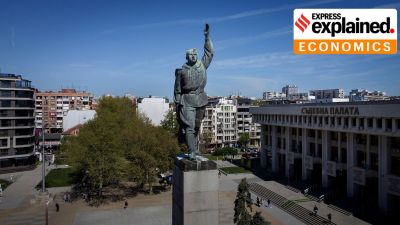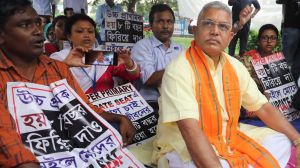Heavy Metal
How Lakshmi Mittal conquered Europe

Cold Steel,
Tim Bouquet and Byron Ousey
Little, Brown, Rs 650
How Lakshmi Mittal conquered Europe
It8217;s only been two years since an 8220;Indian with funny money8221; 8212; pre-merger Arcelor CEO Guy Dolle8217;s decidedly non-multicultural description of Lakshmi Mittal 8212; wanted to buy a big European company. But big-ticket, global corporate deals with indirect or direct Indian involvement 8212; Mittal, let8217;s remind ourselves again, is an Indian-born British businessman 8212; is already subsumed in news consciousness. These days, Indian blue chips can be bought by foreigners with no political complications. As Daiichi took control of Ranbaxy, no one, in an establishment still prone to bouts of silly economic nationalism, made ugly comments on the Japanese. This is hopefully a trend and if it does become a trend the sulfurous bitching from the European establishment about Mittal8217;s 2006 Arcelor bid will look even nastier than it did then.
Bouquet and Ousey energetically list the crude and sophisticated versions of continental European superiority complex as Arcelor, with the help of three European governments, defended itself against Mittal8217;s bid. That should tell you that genre-wise, this book is the business history equivalent of conscientiously researched, true crime novellas. Bouquet and Ousey have interviewed scores of people involved in the Mittal-Arcelor fight, have travelled to cities where the principals strategised and even visited homes and hotels where they plotted and slept. The research comes through but it8217;s not, as they say in publishing trade, heavy. Indeed, that would have destroyed the purpose of the book, which is meant to entertain as much it informs and analyses.
Bouquet and Ousey manage to nicely entertain as well as inform/analyse, with the caveats that the writing style isn8217;t exactly beautiful, that some of the descriptive flourishes, for example about Mittal8217;s London home, Dolle8217;s early years, macho investment bankers, can be cringe-making and that there8217;s too much of newspaper profile feel about the narrative.
Discerning Indian readers may find the thumbnail sketch of Mittal8217;s early years and the description of his cultural roots a little too glib, too much in the how-exotic-therefore-how-great mode of well-intentioned western commentary. Indeed, the issue of how Indian families, whether or not they are citizens of and headquartered in India doesn8217;t matter here, run their business and how they hold up against best practice transparency norms is not given enough critical attention. Bouquet and Ousey dutifully record Dolle8217;s and others8217; objections to Mittal8217;s corporate governance structure, and tease out the prejudice from the facts. But the facts deserved more analysis.
Still, this is a fair book 8212; probably its best virtue. Even Dolle, the principal who behaved badly and lost and is now in quasi-retirement, can8217;t complain. It8217;s also comprehensive, it ends with a post-merger report and leaves out nothing that influenced or was engendered by the Mittal vs Arcelor fight. Even Kamal Nath8217;s 15 seconds in global corporate limelight is recorded 8212; the commerce minister had shot off an angry letter to Peter Mandelson, the EU trade commissioner, protesting against Dolle8217;s and others8217; display of old-fashion prejudice.
But Mittal, to repeat, is a British businessman and Kamal Nath really was off the mark in attaching the Indian government formally to the controversy. So it8217;s good to know that at the party celebrating his takeover of Arcelor, the music Lakshmi Mittal chose was not the strains of the sitar or sarod, but the theme from Goldfinger. Business, like Bond, doesn8217;t want to recognise boundaries.
- 01
- 02
- 03
- 04
- 05































